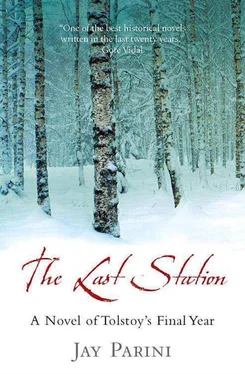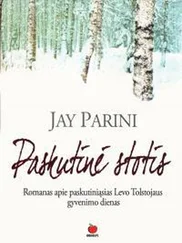Chertkov belched into a silk handkerchief. ‘Novels are for women, for pampered, bourgeois women who have nothing better to do with their time.’
‘But Anna Karenina –’
‘It’s a decent example, but still quite foolish.’
‘Vladimir Grigorevich, I…’
He stared at me with tiny eyes that did not seem human. They were the eyes of a weasel.
‘I liked Anna Karenina .’
‘You’re a young man, Valentin Fedorovich! Young men like novels. I did, many years ago. My mother, in fact, was a friend of Turgenev. Fiction is for people who have not yet properly begun their search for God. What subjects intrigue these novelists? I will tell you. Lust and adultery.’ His upper lip curled, exposing his teeth like alder roots in a swamp.
I dipped my head forward and mumbled.
Chertkov drew his lips into a sidelong sharklike smile. ‘I like you very much, dear boy. I’m sure that Leo Nikolayevich will be grateful to you for whatever help you can give him.’ As he spoke, he pulled thin black leather gloves over his hands to hide a particularly raw patch of eczema. I felt sure, at last, the job was mine.
‘I hope I will be able to help him,’ I said.
‘You will. I see that.’
I grinned stupidly, and Chertkov, as if annoyed with me, stood up. ‘Good-bye now,’ he said. ‘I look forward to receiving your diaries. And remember: Don’t let anyone find out about them. Not even Leo Nikolayevich. It would distress him.’
We shook hands, exchanging a few words about my preparations for the trip to Tula, by train, the following week. He escorted me into the dark front hall. Our footsteps echoed off the high ceiling and slate floor. A servant held out my coat and hat for me.
‘I would not entrust you with this position if I didn’t believe you were one of us,’ Chertkov said, his black-gloved hands resting on my shoulders. ‘I’m terribly worried, you know. Leo Nikolayevich is frail and nervous, though you will never hear a word of complaint from him. It is painful that I should have to live apart from him in his last days.’
I nodded, but his comment did not seem to require affirmation.
‘I’m grateful to you, Vladimir Grigorevich,’ I said.
He deflected my comment with a wave of one hand.
‘Godspeed,’ he said, pushing the door open against a swirl of snow. ‘And remember what I said: write everything down !’ He kissed me on either cheek and pushed me into the fierce January wind. A black sleigh waited for me in the drive, with a driver bundled in so much fur that he did not look human.
We drove off at a trot along a winding road through a line of bare elms. Huddled in my kaftan, with the light snow ticking on my forehead, I felt exalted and terrified – like Elijah being whisked to heaven in a whirlwind fire.
LETTER TO PYOTR MELNIKOV, A WORKER FROM BAKU
YASNAYA POLYANA, 22 JANUARY 1910
It seems to me that two issues concern you: God? – what is God? – and the nature of the human soul. You also inquire about God’s relation to humankind, and wonder about life after death.
Let me take the first question. What is God and how does he relate to humankind? The Bible says a lot about how God created the universe and how he relates to his people, meting out rewards and punishments. This is nonsense. Forget it altogether. Put it out of your mind. God is the beginning of all things, the essential condition of our being, and a little bit of what we take to be life within us and revealed to us by Love (hence we say, ‘God is Love’). But, again, please forget those arguments about God creating the world and the human race and how he punishes everyone who disobeys. You must erase that from your mind in order to consider your own life freshly.
What I have said is all we know of God, or can know.
About the soul, we can only say that what we refer to as life is merely the divine principle. Without it nothing would exist. There is nothing physical about it, nothing temporal. So it cannot die when the body ceases to exist.
You also – like all of us – want to know about life after death.
In order to understand me, pay close attention to what I say next.
For mortal man (that is, for the body alone) time exists: that is, hours, days, months, and years pass. For the body alone, there also exists the physical world – what can be seen, touched by the hands. What is big or little, hard or soft, durable or fragile. But the soul is timeless; it merely resides in the human body. The I that I spoke of seventy years ago is the same I I refer to now. Nor does the soul have anything physical about it. Wherever I am, no matter what happens, my soul, the I that I refer to, stays the same and is always nonphysical. Thus, time exists only for the body. For the soul, time and place and the physical world have no reality. Therefore, we can’t really ask what will happen to the soul or where, after death, it will go, because the phrase will be suggests time, and the word where suggests place. Neither time nor place has meaning for the soul once the physical body has ceased to be.
That speculations about life after death or heaven and hell are shallow and mistaken should by now be clear. If the soul were going somewhere to live after death, it would have been somewhere before birth. But nobody seems to notice that.
My feeling is that the soul within us does not die when our body dies, but that we cannot know what will happen to it and where it will go – even though we do know that it cannot die. About punishments and rewards: I think our life here has meaning only when we live in accordance with the commandment to love one another. Life becomes distressing, troubled – bad – when we ignore this commandment. It would seem that whatever rewards and punishments our deeds warrant, we shall receive in this life, since none other can be known.
I know it for sure now. They’ll do anything to come between me and my husband. It would be hard enough, God knows, without them pursuing us like Furies. What’s worse is they think I don’t know about their plan to write me and my children – Leo Tolstoy’s children and grandchildren! – out of his will. I always know what’s going on behind my back. I can tell it by their looks, their whispers and winks, even their deference. They somehow imagine I don’t notice the secret messages delivered when my back is turned. Only yesterday a servant carried a letter from Sergeyenko to Lyovochka right under my nose, but, of course, I recognized his big, loopy handwriting on the envelope! Do they think I was born yesterday?
They spread rumors about me to the press. Last week an article appeared in Moscow claiming, ‘Countess Tolstoy has become estranged from her husband. They barely talk. They do not share a similar view of politics or religion.’ What nonsense! And it has all been spread by Chertkov and his friends, who have succeeded in coming between me and Lyovochka, in spite of our forty-eight years of marriage. In the end, however, I will triumph. Our love will triumph.
I’m treated as a stranger here. But am I not the very person who bore Leo Tolstoy his thirteen children (not bad for a preacher of chastity!), the woman who sees that his clothes are washed and mended, his vegetarian meals prepared to his liking? Am I not the one who takes his pulse before he falls asleep each night, who gives him enemas when his bowels are blocked, who brings him tea with a large slice of lemon when he cannot sleep?
I am a slave. An outcast in my own household. To think that I was the daughter of a famous Moscow physician! My father admired Leo Nikolayevich for his position in the aristocracy, yes, but also for his literary accomplishments. Who wouldn’t? Even then, it was obvious that he would become an important writer. He was the talk of Moscow and St Petersburg. I can remember my mother saying to me, ‘One day you will read about Count Tolstoy in the Encyclopedia.’
Читать дальше












